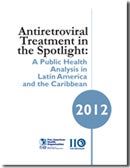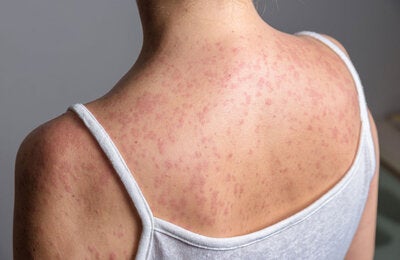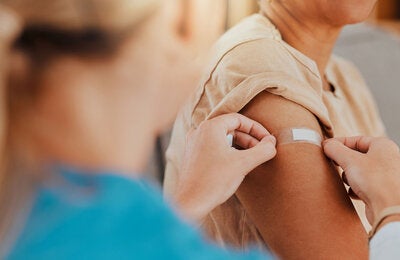

Latin America and the Caribbean (LAC) have the highest rates of antiretroviral treatment (ART) coverage of any developing region in the world, with an estimated 63 percent of people with HIV who need...
New report says health system weaknesses threaten the region's status as a global leader in ART
 Washington, D.C., 3 May 2012 (PAHO/WHO) — Latin America and the Caribbean (LAC) have the highest rates of antiretroviral treatment (ART) coverage of any developing region in the world, with an estimated 63 percent of people with HIV who need treatment receiving it.
Washington, D.C., 3 May 2012 (PAHO/WHO) — Latin America and the Caribbean (LAC) have the highest rates of antiretroviral treatment (ART) coverage of any developing region in the world, with an estimated 63 percent of people with HIV who need treatment receiving it.
But a new report from the Pan American Health Organization/World Health Organization (PAHO/WHO) says that preserving the region's leadership in providing ART will require overcoming health system problems that range from drug stock-outs to lack of cost-effectiveness in the use of drug combinations.
The report, Antiretroviral treatment in the spotlight: a public health analysis in Latin America and the Caribbean, analyzes the vulnerabilities of ART programs in LAC and makes recommendations for strengthening countries' health systems to ensure the sustainability of those programs and continued progress toward universal access to ART.
"We are proud to see that the LAC region has staged an unprecedented response to HIV, with leading rates of ART coverage available free of charge through all national programs," PAHO Director Dr. Mirta Roses Periago writes in the report's preface. With this new study, "PAHO is engaging Member States, civil society, and technical partners to move from the baseline described in this report through a series of programmatic steps that, supported by the provision of quality technical cooperation, will define the implementation of a new generation of HIV treatment programs in the Americas."
The report analyzes data on ART prices, procurement and consumption patterns; HIV-tuberculosis co-infections; and dependence on external financing, among other variables. It concludes that the majority of patients receiving ART in LAC are taking effective and safe antiretrovirals (ARV).
However, the report highlights a number of challenges in ensuring effectiveness and efficiency in the use of ARV. A small percentage of patients—5 percent of those on first-line therapy and 14 percent on second-line therapy—are taking inappropriate combinations, according to the study. A more generalized problem is inefficiency: the median number of first-line ARV regimes in each LAC country is 12, and the median number of second-line regimens is 15, in both cases more than twice the WHO recommendation of six different regimens per treatment line. Compounding this problem is the fact that many countries are paying higher prices for ARV than necessary, due to shortcomings in procurement practices.
Other key findings include:
- All LAC countries have existing policies for free access to ART as a basic human right.
- By the end of 2010, 521,000 people in LAC were receiving ART, representing, on average, 63 percent of those who need such treatment.
- Only 11 of 36 countries in LAC report a high dependency on external financing for ART. These countries account for approximately 20 percent of persons living with HIV.
- In 2010, some 63 percent of LAC adults in first-line ART and 33 percent in second-line ART were using WHO-recommended regimens.
- In 2011, more than half of LAC countries (14 out of 26 countries, or 54 percent) reported at least one stock-out episode. Main causes include bidding, procurement and distribution problems and complications in ARV production.
- In 2010, retention rates for ART patients varied from country to country, from 61 percent up to 100 percent.
- In 14 countries for which data are available, 37 percent of patients entered care at an advanced stage of immunodeficiency.
In view of these findings, the report makes recommendations for improving the sustainability, effectiveness, efficiency, equity and protection of fundamental health rights with respect to ART. It focuses on priority areas identified in the new WHO/UNAIDS approach known as "Treatment 2.0." These include optimizing drug regimens, providing access to point-of-care and other simplified platforms for diagnosis and monitoring of patients, reducing costs, adapting delivery systems, and mobilizing community involvement and support.
The report's specific recommendations, aimed at countries' health authorities, include:
- Simplify treatment by reducing the number of ART regimens to those with the highest effectiveness.
- Increase the use of fixed-dose, single-tablet combinations to maximize patient adherence.
- Phase out obsolete drugs, especially highly toxic medications such as stavudine.
- Increase use of international procurement mechanisms such as the PAHO Strategic Fund to support country procurement processes.
- Overhaul service delivery with renewed models based on strategic information and patient-centered care.
- Expand and ensure early diagnosis of HIV infection, improve referral to treatment, and strengthen monitoring of patient viral loads and CD4.
- Promote policy dialogue and explore national resources available to reduce dependency on external resources for ART.
- Accelerate innovation-transfer programs and services such as appropriate use of rapid tests, simplified diagnostic algorithms, new drug formulations, adherence-support measures, and web-based monitoring platforms for strategic commodities and drugs.
About ART
Standard antiretroviral therapy (ART) consists of the combination of at least three antiretroviral (ARV) drugs taken daily for life to maximally suppress the HIV virus and stop the progression of HIV disease. Huge reductions have been seen in rates of death and suffering when use is made of a potent antiretroviral regimen, particularly in early stages of the disease. Furthermore, expanded access to ART can also reduce transmission of HIV.
PAHO was established in 1902 and works with all the countries of the Americas to improve the health and quality of life of the people of the Americas. It also serves as the Regional Office for the Americas of the World Health Organization (WHO).
Links:
- Antiretroviral treatment in the spotlight: a public health analysis in Latin America and the Caribbean
- PAHO program on HIV and sexually transmitted infections
- Video: Tratamiento Antirretroviral bajo la lupa (In Spanish)
Media contacts:
Leticia Linn Tel +1 202 974 3440 Mobile +1 202 701 4005, linnl@paho.org
Donna Eberwine-Villagran Tel +1 202 974 3122 Mobile +1 202 316 5469, eberwind@paho.org
Sonia Mey Tel +1 202 974 3036 Mobile +1 202 251 2646, maysonia@paho.org
Media Relations, Area of Knowledge Management and Communication, www.paho.org



